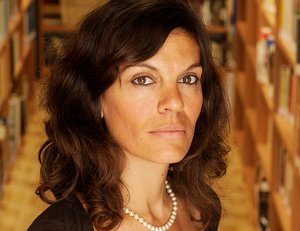
Ośrodek Badań nad Kulturami Pamięci zaprasza na spotkanie w ramach projektu badawczego "Historie potencjalne Europy Środkowo-Wschodniej", realizowanego w ramach POB Heritage - Excellence Initiative Uniwersytetu Jagiellońskiego.
Dr Varela, autorka m.in. książki "A People's History of Europe. From World War I to Today" (2021), będzie broniła tezy, że historia ludowa nie jest historią części populacji ani konkretnego tematu. Jest to historia po prostu. Rozumiejąc ją w ten sposób, mobilizujemy nie tylko tych, którzy pracują - dotykamy rdzenia tego, co jest kluczowe dla wyjaśnienia sposobów działania ludzkich społeczeństw. To, co jest produkowane w społeczeństwie, pochodzi z pracy i tylko praca wytwarza wartość. Historia pracy i jej świata nie jest historią robotników, lecz historią społeczeństwa jako całości. Taka wiedza o przeszłości pozwala wspiąć się na szczyt góry i stamtąd zobaczyć linię horyzontu.
Wykład "Historia ludowa: historia i pamięć" odbędzie się 25 marca o godzinie 18:00 w sali 42 na Wydziale Polonistyki Uniwersytetu Jagiellońskiego w Krakowie (Gołębia 16), a Raquel Varela będzie na nim obecna osobiście. Zachęcamy wszystkich do dołączenia do nas zarówno na miejscu, jak i online i zaangażowania się w późniejszą dyskusję.
Spotkanie będzie moderowane przez Jakuba Muchowskiego (IH UJ). Wydarzenie odbędzie się w języku angielskim.
O prelegentach:
Raquel Varela jest historyczką pracy, badaczką i profesorką na New University of Lisbon oraz Honorową Stypendystką Międzynarodowego Instytutu Historii Społecznej. Jest także przewodniczącą Międzynarodowego Stowarzyszenia Strajków i Konfliktów Społecznych oraz współredaktorką jego czasopisma. Jest autorką m.in. książki "A People's History of the Portuguese Revolution" (Pluto, 2018).
Jakub Muchowski jest adiunktem na Wydziale Historycznym Uniwersytetu Jagiellońskiego. Jego badania koncentrują się na teorii pisarstwa historycznego, polskich kulturach pamięci, transnarodowej historii Polski i historii pracy. Obecnie zajmuje się czytelnictwem tekstów historycznych, transnarodowymi relacjami między Polską a RPA oraz formami niewidzialności pracy w muzeach przemysłowych. Jest autorem książki Polityka pisarstwa historycznego (2015) oraz artykułów w czasopismach takich jak "Journal of the Philosophy of History", "International Journal of Heritage Studies" i "Historyka".
Dr. Raquel Varela, Peoples History: History and Memory | lecture and discussion
The Research Center for Memory Cultures invites everyone to the meeting of the research project "Potential Histories of East-Central Europe," carried out within the framework of the POB Heritage - Excellence Initiative of the Jagiellonian University.
Dr. Varela wants to defend a key idea: social history, the history of those below, or of the people´s history, is not the history of a part of the population or of a specific theme, as would be the history of ideas and mentalities, of eating habits, or military history or - one that has been dominant in our midst since the 1980s, and the entry into the period of sharp decline of global capitalism, neoliberalism - political and institutional history. We went from kings and lords, under the influence of resistance to Nazi-fascism and anti-colonial revolutions, to a diffusion of social history in the 1970s. And to a history, after 1986-89, of States and structures, that is, institutions. The history of the people is history, this is the central argument of her text. When we do this, we mobilize not only those who work and social dynamics as subjects, we summon the core of what is central to explaining human societies and, even, humanity.
Social history – which we sought to do in the Peoples History of Europe or the Peoples History of the Carnation Revolution and in our recent Peoples History of Portugal – allows us to climb to the top of the mountain and, from there, see the horizon line. It places us in a place that allows us to understand different societies not in their appearance (mercantile exchange, money-form, “things” etc.) or in their figuration (parties, Church, leaderships etc.), but in their essence – everything. What is produced in society comes from work and only work produces value. And work, in actually existing capitalism, is not a contractual arrangement signed between free people, this is just its formal legal representation, but a social relationship between different social classes: the bourgeoisie and the workers. These classes are not the only ones that exist, but they are, after being consolidated in the contemporary period of advanced capitalism, those that determine the entire social structure in which we work and, therefore, the entire way of thinking, feeling and living life. The history of work and its world is not the history of workers, it is, in fact, the history of society as a whole.
The meeting will take place on 25 March at 6:00 PM in room 42, the Faculty of Polish Studies, Jagiellonian University in Krakow (Gołębia 16), with Raquel Varela attending in person. We encourage everyone to join us both on-site and on-line and engage in the subsequent discussion! To access the meeting online kindly use the following MS Teams link: https://teams.microsoft.com/l/meetup-join/19%3a61fa728adf5c4d3190e81002a1b0a6b4%40thread.tacv2/1710791932240?context=%7b%22Tid%22%3a%22eb0e26eb-bfbe-47d2-9e90-ebd2426dbceb%22%2c%22Oid%22%3a%22604482a1-90aa-446c-9bf0-bc0855e4055d%22%7d
The meeting will be moderated by Jakub Muchowski. The event will be held in English.
About the speakers:
Raquel Varela is a labour historian, researcher and Professor at New University of Lisbon, and Honorary Fellow at the International Institute for Social History. She is also president of the International Association of Strikes and Social Conflicts and co-editor of its journal. She is the author of A People's History of the Portuguese Revolution (Pluto, 2018).
Jakub Muchowski is an adjunct professor at the Department of History of Jagiellonian University. His research focuses on the theory of historical writing, Polish memory cultures, transnational history of Poland and labour history. Ongoing work centres on readership of historical writing, transnational relations between Poland and South Africa and forms of invisibility of labour in industrial museums. He has authored a book Polityka pisarstwa historycznego (Politics of Historical Writing, 2015) and articles in journals including Journal of the Philosophy of History, International Journal of Heritage Studies and Historyka.
link do wydarzenia na FB: https://www.facebook.com/events/783880946949231/?ti=ls
